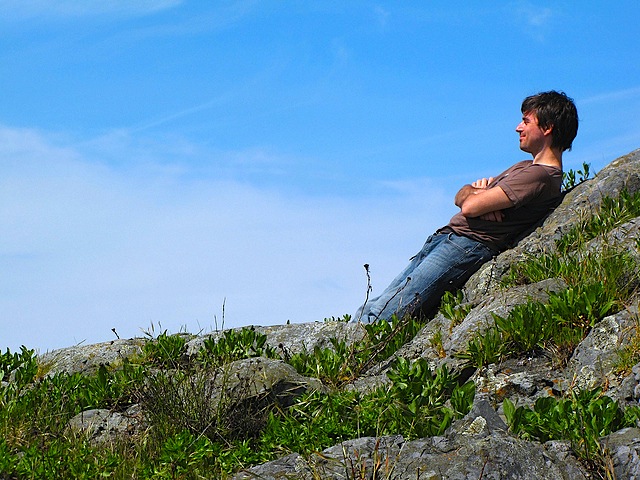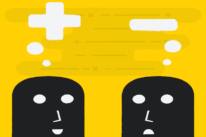“The time to relax is when you don’t have time for it.” ~Sydney J. Harris
A few weeks ago, I had a panic attack. It was the first time in my life that I had experienced such unfamiliar feelings of intense fear and debilitating terror. As each prolonged minute painfully elapsed, I honestly thought that I was dying.
At the time, of course, I had no idea what was happening to my body.
I did not know why my heart was racing, why my face was numb, or why my tongue felt like it was choking me. Why my hands and feet were tingling, why my arms felt heavy, why my head was spinning. Or why I felt absolutely certain that my body was shutting down.
I had convinced myself that what I was experiencing was unquestionably my central nervous system failing. I needed to seek medical attention immediately. I couldn’t allow myself to die right here in my kitchen.
So, I called an ambulance.
The paramedics ran a few tests, assuring me that, thankfully, I was not about to die and my condition was far from my self-diagnosed critical state.
As I started to calm down, regaining control of my breathing, the physical symptoms slowly dispersed. I began to realize that the problem that had suddenly overpowered my entire body, was in fact, all in my head.
My mind was suffering from extreme exhaustion.
The troubling thing was that panic attack had happened to me out of the blue with absolutely no warning signs. It was a seemingly average day; I was getting ready for work after a morning of studying and visiting the gym. I could not identify the obvious trigger.
Over the days that followed, I felt physically and mentally drained.
My body ached, muscles felt tense and sore, to the extent that I even lost control of my tongue, making the simple act of speaking a tiresome struggle. My head was working hard to make sense of it all, while trying to sift through the relentless negative thoughts I was constantly creating.
During those weeks afterward, I learned how much the mind can affect the body, and vice versa. I also learned how vitally important it is to take care of your mind, reduce stress, and be kind to yourself.
The world is full of stress inducing scenarios; it’s how we react to them that really matters.
Listen to your body.
Your body is your greatest teacher. It knows you better than any standardized text book or generic medical advice.
I learned that prescribed antidepressant medication did not work well in my body; however, daily relaxation techniques through yoga and meditation invited a little bit of mental clarity into my day.
Only you know what works best in your body, and what makes your heart sing.
Just be.
We need to understand that we are human-beings, not human-doings.
Taking time out of the busyness of everyday life to just be is good medicine for the body and soul. By disconnecting from the influx of social media updates, the steady stream of e-mails, and instant text-messaging communication, we can recharge naturally away from the buzz of the electronic world.
The best thing is, we don’t actually need to do anything—so put down the books, turn off the guided relaxation CD, and just feel content with just being where you are, in this very moment.
Trust the process.
Sometimes we push too hard to make things happen.
In the weeks leading up to my panic attack, I was driven by the fear of failure. Everyday, I was overexerting my brain, force-feeding it information to get ahead in my studies, reasoning with myself this was the only route to success. Consequently, I had very little time to relax and absorb this new acquired knowledge.
Trust that where you are right now is exactly where you are supposed to be. Learn that life becomes much easier when you stop fighting against the resistance of your own limitations, just relax, and go with the flow.
Be open to change.
We all know that nothing stays the same forever. However, problems arise when we become attached to the way things are.
Accept that life is a series of ever-changing events and situations. And new opportunities will present themselves to you from time to time. The end of your job in one company simply means the beginning of a brand new set of life experiences waiting for you in another.
Embrace uncertainty by switching off the worrying mind, replacing the prospect of the unknown with positive anticipation.
Be kind.
Emotions that are cultivated in the mind often manifest themselves somewhere on the human body.
A dull ache in the stomach can translate to a gut full of worries. Similarly, a sore throat may relate to communication and self-expression issues.
By becoming aware of the sensations in your body and allowing them to reach their full expression, you can learn to send kindness the physical problem. This, in turn, brings a sense of clarity and calmness into your mental world.
Moreover, if we take good care of our bodies through gentle exercise, nutritious food choices, massage, or just having a long relaxing soak in the bath, our minds will become less chaotic and more of a comfortable pleasant place to stay.
Photo by GerryT
About Becky Potter
Becky is passionate about writing and travelling. She is keen to inspire people using her own past experiences, with the intention to help others enjoy a happier and healthier life.













 Though I run this site, it is not mine. It's ours. It's not about me. It's about us. Your stories and your wisdom are just as meaningful as mine.
Though I run this site, it is not mine. It's ours. It's not about me. It's about us. Your stories and your wisdom are just as meaningful as mine.